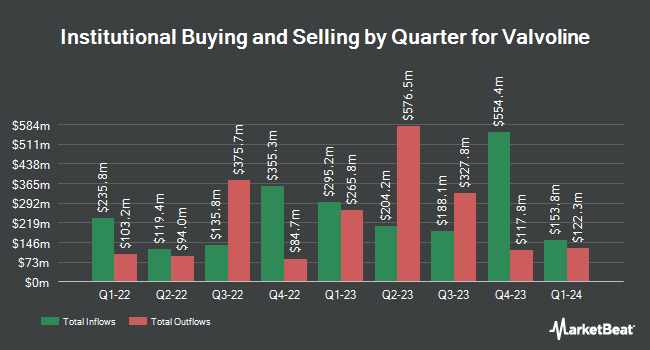Vaughan Nelson Investment Management L.P. boosted its stake in shares of Valvoline (NYSE:VVV - Free Report) by 29.7% in the 1st quarter, according to its most recent disclosure with the SEC. The institutional investor owned 2,045,198 shares of the basic materials company's stock after acquiring an additional 467,885 shares during the period. Vaughan Nelson Investment Management L.P. owned 1.61% of Valvoline worth $71,193,000 at the end of the most recent quarter.
A number of other institutional investors and hedge funds also recently bought and sold shares of VVV. Huntington National Bank boosted its holdings in shares of Valvoline by 1,004.9% during the 4th quarter. Huntington National Bank now owns 895 shares of the basic materials company's stock valued at $32,000 after purchasing an additional 814 shares during the last quarter. Opal Wealth Advisors LLC purchased a new stake in shares of Valvoline in the first quarter worth about $35,000. Centricity Wealth Management LLC purchased a new stake in shares of Valvoline in the fourth quarter worth about $36,000. American National Bank & Trust bought a new position in Valvoline during the first quarter valued at approximately $40,000. Finally, Versant Capital Management Inc grew its holdings in Valvoline by 221.8% during the 1st quarter. Versant Capital Management Inc now owns 1,181 shares of the basic materials company's stock valued at $41,000 after buying an additional 814 shares in the last quarter. 96.13% of the stock is currently owned by institutional investors.
Valvoline Trading Down 0.5%
Shares of VVV stock traded down $0.20 during trading hours on Wednesday, reaching $36.55. 2,419,007 shares of the stock were exchanged, compared to its average volume of 1,484,168. The firm has a market capitalization of $4.65 billion, a price-to-earnings ratio of 17.71 and a beta of 1.17. Valvoline has a 12-month low of $31.02 and a 12-month high of $48.27. The company's 50-day moving average price is $34.65 and its 200-day moving average price is $35.89. The company has a current ratio of 0.73, a quick ratio of 0.60 and a debt-to-equity ratio of 4.23.
Valvoline (NYSE:VVV - Get Free Report) last announced its earnings results on Thursday, May 8th. The basic materials company reported $0.34 earnings per share (EPS) for the quarter, missing the consensus estimate of $0.36 by ($0.02). The business had revenue of $403.20 million for the quarter, compared to analysts' expectations of $405.38 million. Valvoline had a net margin of 15.97% and a return on equity of 106.36%. The firm's quarterly revenue was up 3.7% on a year-over-year basis. During the same quarter last year, the firm earned $0.37 EPS. As a group, equities analysts anticipate that Valvoline will post 1.63 earnings per share for the current year.
Analyst Ratings Changes
Several brokerages have recently issued reports on VVV. TD Cowen began coverage on Valvoline in a report on Friday, April 4th. They set a "buy" rating and a $40.00 price objective on the stock. The Goldman Sachs Group upgraded shares of Valvoline from a "hold" rating to a "buy" rating and boosted their price target for the stock from $40.00 to $45.00 in a research report on Tuesday, June 3rd. Piper Sandler reiterated an "overweight" rating and set a $44.00 price objective (down previously from $45.00) on shares of Valvoline in a research report on Friday, May 9th. Citigroup dropped their price objective on shares of Valvoline from $41.00 to $38.00 and set a "neutral" rating for the company in a research note on Tuesday, April 29th. Finally, Morgan Stanley decreased their target price on shares of Valvoline from $41.00 to $39.00 and set an "equal weight" rating on the stock in a research report on Friday, May 9th. Four research analysts have rated the stock with a hold rating, nine have assigned a buy rating and one has issued a strong buy rating to the stock. According to MarketBeat.com, the company has a consensus rating of "Moderate Buy" and an average price target of $42.54.
Check Out Our Latest Analysis on VVV
Insider Activity at Valvoline
In other Valvoline news, CEO Lori Ann Flees bought 3,000 shares of Valvoline stock in a transaction on Tuesday, May 27th. The shares were acquired at an average price of $33.78 per share, for a total transaction of $101,340.00. Following the completion of the purchase, the chief executive officer now directly owns 46,614 shares in the company, valued at approximately $1,574,620.92. This trade represents a 6.88% increase in their position. The acquisition was disclosed in a filing with the Securities & Exchange Commission, which is available at this link. 0.66% of the stock is owned by company insiders.
Valvoline Company Profile
(
Free Report)
Valvoline Inc engages in the operation and franchising of vehicle service centers and retail stores in the United States and Canada. The company, through its service centers, provides fluid exchange for motor oil, transmission and differential fluid, and coolant; parts replacement for batteries, filters, wiper blades, and belts; and safety services, such as tire inflation and rotation, bulbs, and safety checks.
Featured Articles

Before you consider Valvoline, you'll want to hear this.
MarketBeat keeps track of Wall Street's top-rated and best performing research analysts and the stocks they recommend to their clients on a daily basis. MarketBeat has identified the five stocks that top analysts are quietly whispering to their clients to buy now before the broader market catches on... and Valvoline wasn't on the list.
While Valvoline currently has a Moderate Buy rating among analysts, top-rated analysts believe these five stocks are better buys.
View The Five Stocks Here
MarketBeat's analysts have just released their top five short plays for July 2025. Learn which stocks have the most short interest and how to trade them. Enter your email address to see which companies made the list.
Get This Free Report
Like this article? Share it with a colleague.
Link copied to clipboard.